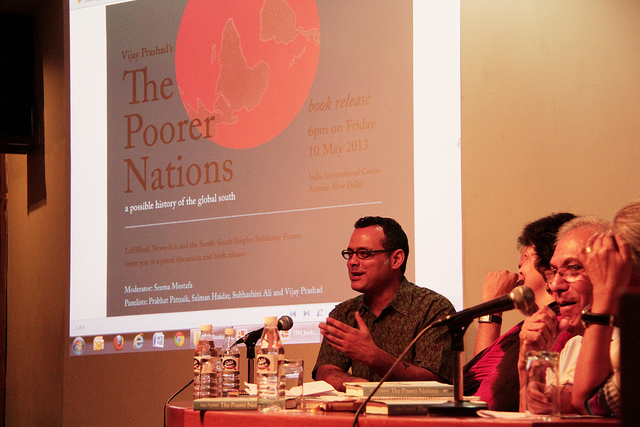Please support our coverage of democratic movements and become a supporter of rabble.ca.
On Labour Day 2015, the world’s attention is focused on the great migration of desperate human beings streaming into Europe from the economic and military catastrophes of North Africa and the Middle East.
The proximate cause of the latest great wave of refugees is the civil war in Syria, a complicated and murky situation in which none of the major players in the military conflict unfolding in and around Syria appear to have the interests of the poor people of that benighted country at heart.
The Conservative government of Canada has been rightly excoriated for its pathetic and disingenuous determination to do as little as possible to solve this burgeoning human crisis — which comes as no surprise to anyone who has been paying attention — while giving the impression we are pulling our weight with the rest of the world. The numbers show we are not.
But while we focus on the impact of a war we little understand, the larger crisis that Europe has been confronting and which will be with it for a long time yet has a cause closer to the meaning of Labour Day than that of Remembrance Day.
Vijay Prashad, Professor of International Studies at Trinity College in Hartford, Conn., and in 2013-14 the Edward Said Chair at the American University of Beirut, discusses the connection between the Mediterranean migration crisis and the rights of working people in a useful essay published last week on Counterpunch.org.
“The West believes that it is acceptable for it to intervene to influence the political economy of the Third World — to force IMF-driven ‘reforms’ on these states,” Dr. Prashad wrote in Regime Change Refugees: On the Shores of Europe.
“Capital is allowed be borderless,” he explains. “That freedom does not apply to labour — to people. Migration is forbidden. … If Capital destroys the society here, its people cannot be allowed to migrate there.
“The West believes that it is acceptable for it to overthrow governments and bomb its enemies in the lands of the Third World. It sees this as the limit of its humanitarianism. It calls this humanitarian interventionism or, in the language of the UN, ‘responsibility to protect’ (R2P). When it breaks states, as it did in Libya, the West takes no responsibility for the broken lives of the people in those zones.”
“Bombs are borderless,” Dr. Prashad goes on. “But war refugees must stand in queues and be held in concentration camps. They are not allowed freedom of movement.”
This is analysis worth pondering when Prime Minister Stephen Harper touts Canada’s strategically unfocused and likely internationally illegal bombing mission in Syria as part of our humanitarian solution to the crisis of the Syrian civil war, and likewise lauds our military’s participation in the disastrous Libyan campaign.
Libya, like Syria and Iraq, is another major source of the refugees streaming, at great peril, toward Europe.
It may be that to solve the crisis in Syria the West has to wage war, although it would help if we could agree on whom. But it should be obvious the task will be much bigger than that.
Regardless, surely the time has come for us to choose a government here in Canada that can look beyond bombs, walls and the concentration of wealth as the only panaceas for humanity’s woes.
Anti-union propagandists still hard at work
Meanwhile, at home in Canada, the same corrosive neoliberal ideology — which, like rust, never sleeps — is once again busy this Labour Day assailing the very things that have made our country a desirable place to live and work, in particular the seasonal neoliberal attack on the right of working people to bargain collectively.
The tireless anti-union propagandists of the Fraser Institute, generously funded by foreign corporate interests that include the notorious Koch Brothers of New York, were at it again this weekend with their annual Labour Day paean to U.S.-style “right-to-work” legislation, laws designed to make it difficult for unions to operate with the hope of destroying utterly the ability of working people to work together for their common good.
This year’s Fraser screed, the distribution of which was abetted as usual by the Postmedia newspaper chain that now dominates print and Internet mainstream news in English-speaking Canada, seems to have dispensed entirely with factual analysis, a trend that began last year when the facts couldn’t be pretzelled to fit the fake institute’s conclusions.
Instead, the Fraser fictionalists mainly spend their time this year singing the praises of the same Harper Government for its patently unconstitutional union “transparency” legislation, commonly known as Bill C-377. This is the law, passed in June, of which former Conservative Senator Hugh Segal predicted: “at the first legal challenge it will be struck down by the courts.”
Other than restating their past claims about the supposed benefits of suppressing unions — which are thoroughly debunked each year — the Fraserites hardly even make an effort now to back them up with analysis. They seem instead to have moved fully into the realm of economic creation science.
Well, it’s still a free country, after a fashion, and there’s not much we can do about the willingness of the Fraser Institute to publish fiction or even outright lies. But we can do something about the foundering media chain that ensures this drivel has a mass audience.
Yes, I understand, a few of those Postmedia newspapers employ union members, but it is nevertheless time for Canadian unions to stop encouraging these unending efforts to destroy collective bargaining and the rights of working people by withholding our advertising dollars from Postmedia’s newspapers.
At the very least, we should do so until they make and live up to a commitment to seek balancing comment, provided in advance, to every story featuring the dubious claims of right-wing thinktankery.
Please support our coverage of democratic movements and become a supporter of rabble.ca.
Image: Flickr/Joe Athialy




